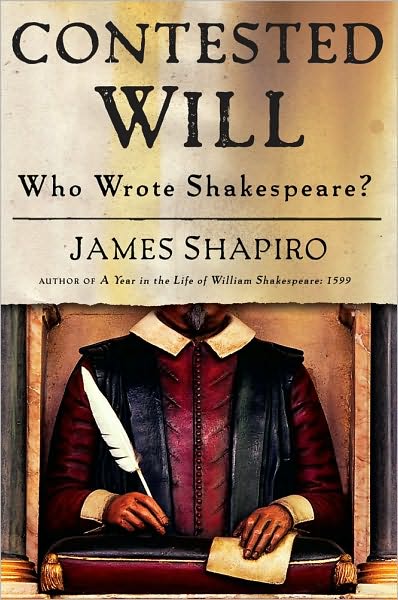You Find What You Look For
Some wise sage has made the point that humans generally find what
they look for. Unfortunately, in many cases this is all too true.
We
have gone up to the Stratford Shakespeare Festival for the last 37
years, so you can safely say that we have more than a passing fancy in
the Bard. Naturally, I was intrigued when Hollywood introduced a film this past
season titled Anonymous that
posed itself as asking (and certainly not answering), “Was Shakespeare
a fraud?” This old controversy (which didn’t exist until 200 years
after Shakespeare’s death) has been nudged to the public’s attention
again. The screenwriters maintain that the real author of Shakespeare’s
works was Edward de Vere, 17th Earl of Oxford.
I was
gratified to find that only 47% of critics gave the film a good review.
The Web site “Rotten Tomatoes” aptly concludes, “Roland Emmerich
delivers his trademark visual and emotional bombast, but the more
‘Anonymous’ stops and tries to convince the audience of its half-baked
theory, the less convincing it becomes.”
Peter Ranier, film critic for The Christian Science Monitor,
explains the conceit of this premise (that Shakespeare’s works were
ghostwritten) and that de Vere was too highly placed to reveal his
identity as a playwright, and so he dragooned poor Will into acting as
his front. Never mind that the film has the Earl writing A Midsummer Night’s Dream when he was 9 (talk about unbelievable premises!) and died in 1604—before Othello, King Lear and The Tempest were conceived.
As
Ranier points out, “If ‘Anonymous’ were simply a lousy movie I’d leave
it at this. The movies have a way of serving as history texts for
gullible audiences. … According to James Shapiro, the author of the
definitive pro-Bard book ‘Contested Will: Who Wrote Shakespeare?,’ Sony
Pictures is reportedly distributing Shakespeare-debunking lesson plans
for literature and history teachers.” The critic ends by commenting,
“Frankly, if I’m going to be offered a heaping pile of revisionism
about the greatest writer who ever lived, I’d rather it be from someone
with more academic heft than the director of ‘Independence Day’ and
‘Godzilla.’ I trust the teachers who receive this film’s study guide
have a shredder handy.”
This controversy, which surfaced in
1850 and has raged on and off ever since, was based largely on the
scanty lack of information about the life of Shakespeare; the history
of this contention is the subject of Shapiro’s well-written scholarly
book. In Shapiro’s research, he discovered a body of archival material
that was un-sifted and often unknown. While rushing to judgment,
biographers had ignored documented fact. A classic case of
You-See-What-You-Want-to-See.
Shapiro’s greatest concern is
that much of the criticism is based in a classism maintaining that only
a man of high position and breeding could have written the exquisite
language of the plays that have now lasted for centuries. The fact that
genius strikes (and always has) inexplicably where it will is always
beyond our ability to critique. The genesis of genius is unfathomable
and often creates discomfort in the more concrete thinkers of the ages.
I love some of the other leads from “Rotten Tomatoes” reviewers:
• “John Orloff’s screenplay could have used a rewrite by de Vere—or whomever.”
• “Bombastic claptrap.”
• “What’s
distressing isn’t the film’s plodding incoherence or wild-eyed
credulousness but it’s misplaced priority: It suggests that what’s most
interesting about this writer we call Shakespeare is not the genius of
his words but the puzzle of his identity.”
• “Will Shakespeare, whose words shine on, bright and brave, is turning o’er with laughter in his grave.”
(You
notice that I only see what I’ve chosen to see—I’m not including any of
the good reviews on this movie; I’m only quoting the “rotten tomatoes.”)
The Web site “Political Facts” printed this opening paragraph from the Boston Globe:
“Most of us like to believe that our opinions have been formed over
time by careful, rational consideration of facts and ideas, and that
the decisions based on those opinions, therefore, have the ring of
soundness and intelligence. In reality, we often base our opinions on
our beliefs, which can have an uneasy relationship with facts. And
rather than facts driving beliefs, our beliefs can dictate the facts we
choose to accept. They can cause us to twist facts so they fit better
with our preconceived notions.”
What intrigues me about this
human tendency to twist the facts to fit our own understanding of truth
is that people often see what they want to see when they look
at the life of Jesus, and question the reality of the evidence the
Christian Church has accumulated for centuries.
John
Polkinghorne, a theoretical physicist who has become an Anglican
priest, considers the truth-seeking aspects of both enterprises as
having what he terms a “cousinly relationship.” He is a Fellow and
former president of Queens’ College, University of Cambridge. In his
remarkable book Quantum Physics and Theology: An Unexpected Kinship,
Polkinghorne explores that relationship but also explains that a
secondary reason for writing this book is for those who look at faith
skeptically. “When I read the writings of some of the high-profile
scientific proclaimers of atheism, I find a degree of ignorance of the
intellectual content of serious biblical study and theological
reflection that is not altogether different from the scientific
ignorance displayed by those who send out papers with titles such as
‘Einstein was wrong.’ If scientists are to reject religious belief,
they should do so with their eyes open and after a proper consideration
of the serious intellectual effort that has been exerted in theology
over many centuries of careful enquiry.”
Now in my sixth
decade, I find I am impatient with myself for not being a better seeker
of truth, and I am vowing to try to improve my approach to seeking,
forcing myself to look past the diatribes and accusations and slanders
this world so easily assumes. These are called blind-spots—not a
Christian disposition we should maintain.
How about you? How are you doing in conforming the world to your own image?
(But I can tell you who wrote Shakespeare. Shakespeare did!)
Karen Mains NOTICES
Come See Shakespeare With Us (and The Matchmaker, Wanderlust, You're a Good Man, Charlie Brown) This Summer
The
Mainses are conducting our annual trip to the Stratford Festival
Monday, July 2 through Saturday, July 7. We’re going to talk more about
this topic and also look at Shakespeare’s religious background—another
blind spot in the ongoing dialogue about the Bard.
We have a
group of seven high-schoolers (some who have been attending since
grade-school days) who enliven our learning. Feel free to bring your
children or grandchildren. The week we are attending is a little
Shakespeare play-lite (only two plays: Henry V and Much Ado About Nothing)—a great season for early exposure.
Our
granddaughter Joscelyn, a freshman in high school, has attended the
Stratford Festival since she was eight. She tried out for a coveted
spot at the Chicago Academy of the Arts and was snapped up mid-term!
Apart from her own dramatic ability and delightful personality, I
suspect the Shakespearean exposure recorded in her resume (seven
summers with the Bard) didn’t hurt.
Follow this link to the brochure: www.hungrysouls.org/Stratford2012.pdf.
Our son-in-law Doug Timberlake and our daughter, Melissa, are taking
over the administrative functions to give us a break from all the
planning we have undertaken through the years. You can call them at
630-461-6501 to ask questions and to register.
Valentine's Deadline: Global Bag Project Home Parties
From
November through December 2011, we sold almost $9000 worth of products.
A home party with 10 people on average sells $500-$600 worth of
reusable bags; with 20 people, we sell, on average, $1000-$1200 worth
of Africa-made bags.
If you contact us before February 14 and volunteer to hold a home party, we will schedule your party on our calendar and send you a charming kanga-cloth apron as a thank-you hostess gift as a sign of our abundant gratitude!
A Party-in-a-Box will be mailed or delivered to you, with a DVD that
walks you and your guests through this 1½ hour event that gives women
beneath the poverty line the means to feed their families, pay the rent
and send their kids to school.
We’ve made the Home Party as simple as possible. Little time investment, HUGE returns!
E-mail GBP Director Carla Boelkens at carla@globalbagproject.org.
BLOGS For This Coming Week
Link is http://blog.karenmains.com/blog/thoughts-by-karen-mains.
Blog topics are "Sick Days," "Watching DVDs During the Daytime," "Try
to Praise the Mutilated World," "Remembering What We Already Know: The
Labor of Older Theologians," and "We Were There: Alternative Energy at
the CSO."
Reminder!
The Soulish Food e-mails are
being
posted biweekly on the Hungry Souls Web
site. Newcomers can look that over and decide if they want to
register on the Web site to receive the biweekly newsletter. You might
want to recommend this to friends also. They can go to www.HungrySouls.org.
|
|

Karen Mains
“What intrigues me
about this human tendency to twist the facts to fit our own
understanding of truth is that people often see what they want
to see when they look at the life of Jesus, and question the reality of
the evidence the Christian Church has accumulated for centuries.”
BOOK CORNER
(TWO BOOKS)

Contested Will:
Who Wrote Shakespeare?
by James Shapiro
Sometimes
we don’t attend Shakespeare plays because we don’t understand them.
Sometimes we don’t read scholarly works because we’re afraid they will
be inaccessible. James Shapiro’s wonderfully readable book about the
essential qualities of literary genius is a work that will intrigue and
entice.
Think about it this way: There must be some reason
that all those people through the centuries have raved about the works
of Shakespeare. What are you missing by judging the genius of the Bard
by that bad production your English teacher forced you to see when you
were in high school?
Some of us have entered into the
delight, the mystery, and the wonder of language exquisite, profound
and pure. If you are a Shakespeare illiterate, this is a great book to
start your journey into the wonder.
Buy From Amazon.com » 
Quantum Physics and Theology: An Unexpected Kinship
by John Polkinghorne
If
you are into physics (yes, some people really, really are), don’t miss
the opportunity to expose yourself to the elegant thinking of John
Polkinghorne. I will admit that I had to work at this some, but even
then, I kept taking deep breaths and thinking, I am being exposed to a
true mastermind. What a privilege!
This is a unusual
synthesis of the commonalities that quantum physics and theology share
in their search for truth. Rarely does a specialist (in both fields)
explain complexity with such clarity. Don’t miss this chance to expose
yourself to a rare thinker (who can be understood by the person with
average intelligence—but a large quantity of curiosity). Highly
recommended. Buy From Amazon.com »
|


